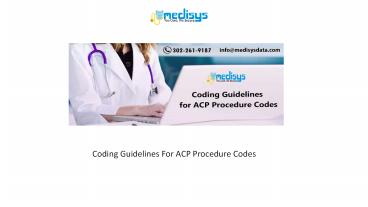Coding Guidelines For ACP Procedure Codes - PowerPoint PPT Presentation
Title:
Coding Guidelines For ACP Procedure Codes
Description:
Advance care planning (ACP) is the face-to-face time a physician or other qualified health care professional spends with a patient, family member, or surrogate to explain and discuss advance directives. As part of this discussion, physicians may talk about advance directives (ADs) with or without completing legal forms. – PowerPoint PPT presentation
Number of Views:5
Title: Coding Guidelines For ACP Procedure Codes
1
Coding Guidelines For ACP Procedure
Codes
2
Coding Guidelines For ACP Procedure Codes
- Advance care planning (ACP) is the face-to-face
time a physician or other qualified health care
professional spends with a patient, family
member, or surrogate to explain and discuss
advance directives. As part of this discussion,
physicians may talk about advance directives
(ADs) with or without completing legal forms. An
AD appoints an agent and/or records the persons
wishes about their medical treatment based on
their values and preferences. In this article we
discussed about coding guidelines for Advance
Care Planning (ACP) for better insurance
reimbursements. - Applicable Procedure Codes for ACP
- CPT Code 99497 Advance care planning including
the explanation and discussion of advance
directives such as standard forms (with
completion of such forms, when performed), by the
physician or other qualified health care
professional first 30 minutes, face-to-face with
the patient, family member(s), and/or surrogate. - CPT Code 99498 each additional 30 minutes (list
separately in addition to code for primary
procedure) - Coding Guidelines for ACP Procedure Codes
- CPT codes 99497 and 99498 are appropriately
provided by physicians or using a team-based
approach provided by physicians, nonphysician
practitioners (NPPs) and other staff under the
order and medical management of the beneficiarys
treating physician.
3
Coding Guidelines For ACP Procedure Codes
- Minimum time required CPT codes 99497 and 99498
are time-based codes, providers should check
minimum time required to report these timed
services. If the required minimum time is not
spent with the beneficiary, family member(s)
and/or surrogate to bill CPT codes 99497 or
99498, the practitioner may consider billing a
different evaluation and management (E/M) service
such as an office visit, provided the
requirements for billing the other E/M service
are met. - Frequency of use There are no limits on the
number of times ACP can be reported for a given
beneficiary in a given time period. Likewise, the
CMS has not established any frequency limits.
When the service is billed multiple times for a
given beneficiary, insurance carrier would expect
to see a documented change in the beneficiarys
health status and/or wishes regarding his or her
end-of-life care. - Place of service There are no place of service
limitations on the ACP codes and these services
may be appropriately furnished in a variety of
settings depending on the needs and condition of
the beneficiary. The codes are separately payable
to the billing physician or practitioner in both
facility and non-facility settings and are not
limited to particular physician specialties. - Other E/M services CPT codes 99497 and 99498 may
billed on the same day or a different day as most
other E/M services, and during the same service
period as transitional care management services
or chronic care management services and within
global surgical periods. CMS also adopted the CPT
guidance prohibiting the reporting of CPT codes
99497 and 99498 on the same date of service as
certain critical care services including neonatal
and pediatric critical care.
4
Coding Guidelines For ACP Procedure Codes
- Diagnosis codes No specific diagnosis is
required for the ACP codes to be billed. It would
be appropriate to report a condition for which
you are counseling the beneficiary, an ICD-10-CM
code to reflect an administrative examination, or
a well exam diagnosis when furnished as part of
the Medicare Annual Wellness Visit (AWV) - Medicare waives the ACP coinsurance and the Part
B deductible when the ACP is Delivered on the
same day as a covered MWV (HCPCS codes G0438 or
G0439) offered by the same provider as a covered
MWV billed with modifier 33 (Preventive
Services) - Documentation Examples of appropriate
documentation would include an account of the
discussion with the beneficiary (or family
members and/or surrogate) regarding the voluntary
nature of the encounter documentation indicating
the explanation of advance directives (along with
completion of those forms, when performed) who
was present and the time spent in the
face-to-face encounter. Practitioners should
consult their Medicare Administrative Contractors
(MACs) regarding documentation requirements. - CPT codes, descriptions and other data are
copyright 2020 American Medical Association. - Medisys Data Solutions handles medical billing
and coding on your behalf. With our assistance in
medical billing for your practice, you can focus
more on patient care. To know more about our
medial billing and coding services, contact us
info_at_medisysdata.com/ 302-261-9187
5
(No Transcript)

